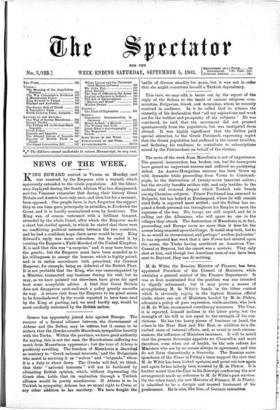M. de Witte, the Russian Minister of Finance, has been
appointed President of the Council of Ministers, while retaining a general control of the Finance Department. It was at first maintained that the position was one intended to dignify retirement; but it may prove a means of strengthening M. de Witte's hands in the bitter contest which is obviously raging in the highest Russian official circle, where one set of Ministers, headed by M. de Plehve, advocate a policy of pure repression, while another, who look to M. de Witte, recommend conciliatory measures. The Czar, it is reported, himself inclines to the latter party, but the strength of his will is not equal to the strength of his con- victions. He has two heavy pieces of business on hand, the crises in the Near East and Far East, in addition to a dis- turbed state of internal affairs, and, as usual in such circum- stances, the influence of Ministers Increases. It will be noted that the present Sovereign appoints no Chancellor, and must therefore, even when out of health, be the sole referee for Ministers who are by no means always in agreement, and who do not form theoretically a hierarchy. The Russian corre- spondents of the Times in Friday's issue support the view that M. de Witte has been kicked upstairs, and point out how again and again he has latterly been worsted by M. de Plehve. It is further noted that the czar in his Rescript confirming the new arrangement made no reference to M. de Witte's past services. On the other hand, the new Minister of Finance, M. de Pleske, is admitted to be a disciple and trusted lieutenant of his predecessor. He is also, like him, of German extraction.










































